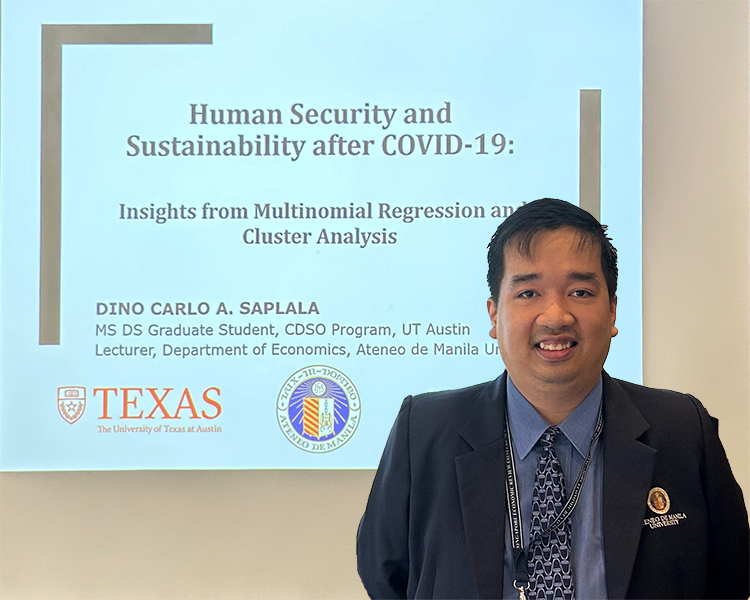
Tammy Dugan sits in her car as another lecture plays on her laptop screen. Her son’s soccer practice just began, and another midterm is just around the corner. She takes out her notebook and begins taking notes, looking past the glare from the sun across her screen as the coach blows the whistle to start practice.
A year ago, she was exploring online programs for artificial intelligence, searching for one that was comprehensive, well-structured, and flexible enough for her busy schedule. After trying three, she still hadn’t found the rigorous, AI-centered coursework she wanted—until UT’s Computer and Data Science Online (CDSO) announced its newest online Master’s of AI, the third in its lineup of online master’s programs.
“It's really helpful because the responsibilities of my life don't get in the way of the learning that is really a key part of me,” said Dugan, who already holds a Master’s in Computer Science. “I like that flexibility.”
With two decades of experience in data analysis and witnessing artificial intelligence rapidly transform the tech industry, Dugan knew she needed to learn more about the constantly changing world of machine learning and generative AI. She chose UT’s MSAI program because it provided the specialized degree she was looking for, with advanced courses in natural language processing, deep learning, and a strong core in ethics.
In 2019, UT Austin set out to create online pathways to its high-caliber programs by launching the online Master’s of Computer Science. Since then, the university has expanded its offerings to include online programs in data science and artificial intelligence. Now unified under Computer and Data Science Online (CDSO), these programs serve more than 3,500 students and account for nearly one-third of the university's graduate population, significantly expanding its educational impact beyond the Forty Acres and around the world. As CDSO celebrates the five-year milestone since the launch of the first program, the program continues to break down barriers, providing a world-class education that reaches students globally and prepares them for the future of technology.
“We wanted to take what was really good about what our faculty was doing in the on-campus programs, and make them accessible to a much broader population of students than would have been able to access these programs in a traditional setting,” said Dr. Eric Busch, CDSO’s managing director.
Students across the globe can obtain a master’s in computer science, artificial intelligence, or data science, each with a fixed tuition rate of $10,000—at a small fraction of the cost of most traditional on-campus master’s programs. UT Austin’s faculty adapt their in-person courses to an online format, continually updating their curriculum to reflect new advancements in the field. Students have access to lectures, teaching assistants, and spaces for connection with other students, without uprooting their lives or taking on additional financial burdens.
“Preparing more students to thrive alongside the dynamism and shifts in the global economy remains a top educational priority for the college and the University,” said David Vanden Bout, dean of the College of Natural Sciences. “These online programs speak directly to that by offering the rigor and excellence of a UT Austin degree at scale, and doing so with a flexible, affordable online format that makes it accessible for more post-baccalaureate students than ever before.”

Dino Carlo Sapala, a second-year student in the online Master’s of Data Science program, studies late into the night, juggling his responsibilities as a student, a lecturer, and a business owner. The first half of his days are spent teaching economics at the Ateneo de Manila University, a private university in Quezon City, Metro Manila, Philippines. He spends the second half managing his family’s business, a role he stepped into after his father retired.
Sapala chose UT’s MSDS program to pursue a graduate education after the COVID-19 pandemic made international travel difficult. Launched in 2021, the MSDS program was created through a partnership between UT’s Department of Data Science and Department of Computer Science. The program offers in-depth coursework in advanced data analysis, modeling, and computational techniques, providing Sapala with an opportunity to deepen his expertise while maintaining his academic career in Manila.
“I wanted to strengthen my quantitative background, especially in statistics,” Saplala said. “... The program enabled me to work with a greater variety of data types.”
The success of CDSO's programs lies not only in their innovative design but also in the strong communities their students build, Busch said. Across time zones and continents, students create supportive networks, transforming what could be an isolated online experience into a collaborative, connected learning environment.
“We’ve seen the remarkable resilience and resourcefulness of our graduate students,” Busch said. “They build strong connections with each other, forming networks to tackle challenges together. These relationships often evolve into professional opportunities and even lasting friendships.”
In these online spaces, students discuss lectures, brainstorm project ideas, and share solutions to problems. Sanchit Agarwal, a student in the online Master’s of Computer Science program, was stuck on a coding problem at his software development job. The code just wouldn’t work. After mentioning the issue to a classmate, they suggested an algorithm they had just covered in class. The new approach worked, instantly solving his problem.
“It actually helped me a lot,” Agarwal said. “That was a very unexpected thing to come out of this program for me: an instant, direct application of what I just learned in that semester.”
Many CDSO graduates go on to pursue PhDs in computer science and data science, applying their coursework to high-level industry research. Some are already driving innovation within major tech companies, using their new expertise to lead research in machine learning and other cutting-edge fields.
CDSO students and alumni are tapping into the incredible potential of AI, data science, and computing to address society’s most pressing challenges. They analyze vast healthcare datasets to enhance patient outcomes, roll out AI solutions for environmental conservation, and promote responsible AI development that prioritizes equity, safety, and ethical use. Drawing from their diverse backgrounds and collaborative approaches, CDSO students are already driving meaningful progress across industries and communities.
As UT Austin marks five years since the launch of its first online master’s, CDSO continues to nurture a growing global community of technology leaders who will shape the future of advancing technology in the twenty-first century.
Built on strong partnerships across campus and a commitment to accessibility, quality, and expanding opportunities, these programs draw on over a century of the university’s educational excellence, to offer an enduring model for higher education that meets today’s needs and adapts for tomorrow’s challenges. Students not only earn a degree from UT, but they also build a sustainable foundation for future success.
“We're onto something. We started these programs with the belief that we could find a way to provide accessible, affordable, high-quality education to a broader population,” Busch said. “We've shown here at UT that it is possible.”
